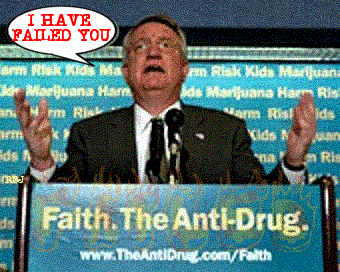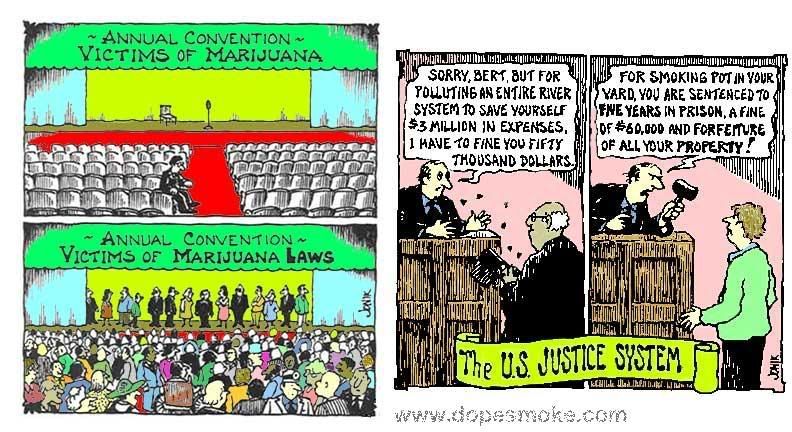RE: drug war total failure and farce
From: The War Of Terror
Date: 14 Sep 2008, 22:17
'they' started it anyway in thee 1960s-they set it all up. 'they' wanted a market for the drug menace and threw LSD over the university walls. they encouraged a culture of drugtaking via celebrities on tv shows. do some research.
baz
----------------- Bulletin Message -----------------
thnks: Jerry ☠Inciting Dissent☠
Date: 15 Sep 2008, 10:06 AM
----------------- Bulletin Message -----------------
From: Zag
Date: Sep 14, 2008 8:52 PM
TheGaianDragon. com

Rainbojangles
"The numbers are in. Marijuana prohibition is a wasteful farce. And John Walters' tenure as drug czar has been a failure"


"When we push back against the drug problem, it gets smaller." -- John Walters, White House Drug Czar
Well, now we know why federal officials chose to release the 2007 National Survey on Drug Use and Health (NSDUH) on a day when the Republican convention's climax and a string of hurricanes is likely to keep it out of the headlines. The survey pretty much dynamites Office of National Drug Control Policy chief John Walters' claims of success in reducing marijuana and drug use during his tenure, which he'd like us to attribute to his aggressive policies, and particularly ONDCP's near-obsession with demonizing marijuana.
First, some raw numbers: The total number of Americans who have used illicit drugs is up from 108 million in 2002, the first full year of Walters' tenure, to 114 million in 2007. And the number of Americans who've used marijuana has passed the 100 million mark for the first time -- up from 95 million in 2002.
Rates of drug use have gone up as well. In 2002, 46.0 percent of Americans had used an illicit drug at some point in their lives. In 2007 it was 46.1 percent. For marijuana, the rate went from 40.4 percent to 40.6 percent. Both the "any illicit drug" and marijuana use rates had dropped a bit in 2006 and spiked notably in the new survey. Illicit use of painkillers such as OxyContin is up notably -- a disturbing trend considering the addictive nature of such drugs, not to mention the risk of fatal overdose (a nonexistent risk with marijuana). "Current" (past 30 days) use of illicit drugs is down only marginally since 2002 -- from 8.3 percent to 8.0 percent for all illicit drugs, and the trend for marijuana is similar.
And, strikingly, despite all of Walters' huffing and puffing about marijuana, the number of Americans starting marijuana use for the first time has not budged during his tenure.
If this is success, someone please tell me what failure looks like.
But wait, there's more. ONDCP officials regularly argue that maintaining criminal penalties for marijuana possession is essential to stopping drug abuse. So what's happened with a dangerous drug whose possession is legal: cigarettes? NSDUH conveniently provides figures for past-month cigarette use, and both the number of users and the rate of cigarette use is down markedly. In 2002, 26 percent of Americans were current cigarette smokers; now it's 24.2 percent, continuing a decades-long decline. And the decline in current cigarette smoking for 12-to-17-year-olds is even more dramatic, from 13 percent to 9.8 percent.
That, of course, is with zero arrests for cigarette possession, compared with 739,000 marijuana possession arrests in 2006 (the last year for which stats are available).
The numbers are in. Marijuana prohibition is a wasteful farce. And John Walters' tenure as drug czar has been a failure.


Dressing Up Failure: Will Drug Czar Finally Face Reality with Release of New Drug Survey Thursday?
September 3, 2008
(WASHINGTON, D.C.) With release of the annual National Survey on Drug Use and Health slated for Thursday morning, drug policy analysts are asking: Will ONDCP director John Walters acknowledge reality this time, or continue the deceptive spin that has marked his tenure as drug czar?
“As drug czar, John Walters has been a veritable disinformation machine,” said Aaron Houston, director of government relations for the Marijuana Policy Project in Washington, D.C. “Despite reams of scientific data showing that his claims are flat wrong, Walters touts get-tough policies and a rigid reliance on marijuana prohibition as essential to protecting young people from drug abuse.”
A World Health Organization study published this July found that despite having some of the world’s strictest marijuana laws — resulting in some 830,000 marijuana arrests in 2006 — the United States had the highest marijuana use rate of 17 countries surveyed. Compared to the Netherlands, which allows purchase and possession of small amounts of marijuana by adults, the United States had double the rate of marijuana use overall, with nearly three times as many youths trying marijuana by age 15. The study, conducted by an internationally renowned group of researchers, concluded that drug use rates have no simple relationship to policy, directly contradicting Walters’ central message for the last seven years.
Even more worrisome, Houston noted, were signs that Walters’ obsessive emphasis on marijuana — the subject of over 100 government TV, radio and print advertisements as well as dozens of federal reports and news releases during Walters’ tenure — may be misleading teens about the dangers of drugs that are far more lethal. According to the federally funded Monitoring the Future survey, teen use of deadly inhalants has remained virtually unchanged during Walters’ tenure, and actually rose among 10th-graders in 2007. Eighth-graders’ use of heroin and hallucinogens also rose last year.
“John Walters is an ideologue from the George W. Bush White House whose only interest in data is whether he can spin it to justify a completely failed approach,” Houston said. “He can lie all he wants, but that doesn’t make it true.”
With more than 25,000 members and 100,000 e-mail subscribers nationwide, the Marijuana Policy Project is the largest marijuana policy reform organization in the United States. MPP believes that the best way to minimize the harm associated with marijuana is to regulate marijuana in a manner similar to alcohol. For more information, please visit http://MarijuanaPolicy. org.
WWW. LUNAPIC. COM


Rainbojangles

----------------- Bulletin Message -----------------
and thanks, also: jane
Date: 15 Sep 2008, 10:13 AM

 ..
..



0 Comments:
Post a Comment
<< Home